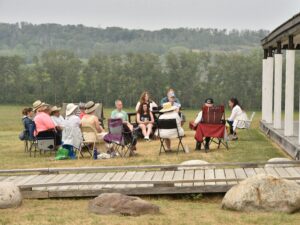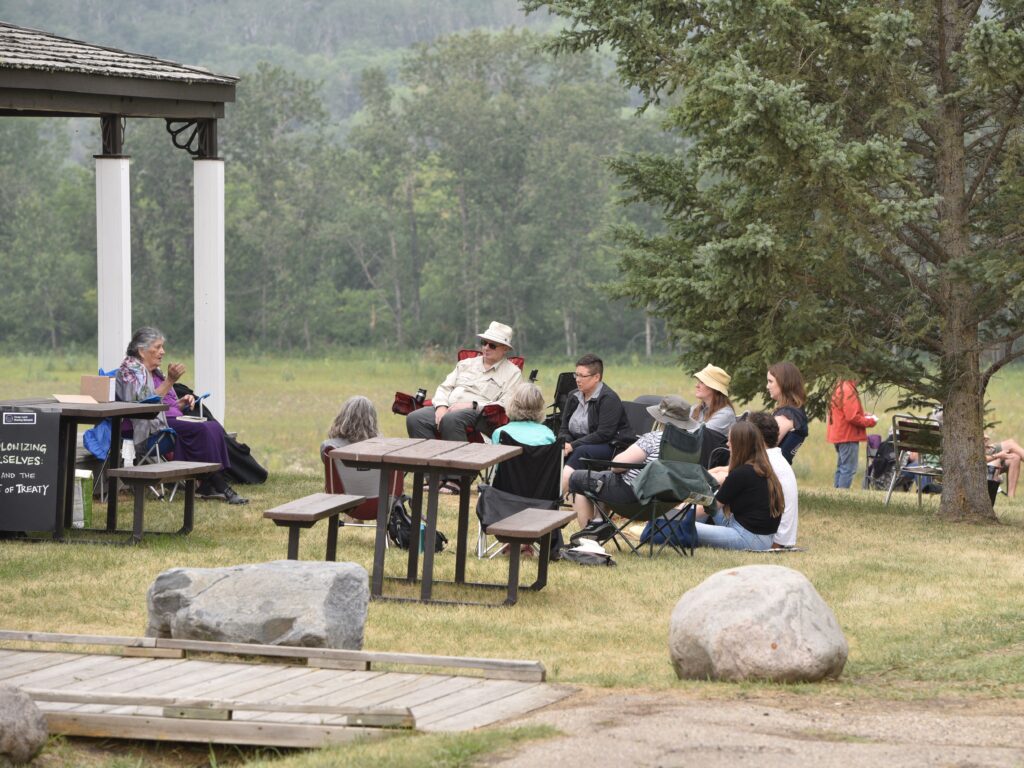A reflection on Decolonizing Ourselves: Land and the Spirit of Treaty

On Saturday, August 7, 2021, I had the privilege of joining approximately 60 others “on the land” at Fort Carlton, an hour or so north of Saskatoon. We were mostly settlers, interested in learning and thinking about land in new, “decolonial” ways. I was part of the organizing committee, and being “on the land” was important to us; we specifically chose Fort Carlton for its historical significance: it was the site where Treaty 6 was negotiated between Canada and First Nations 145 years ago.
Participants divided into groups and circulated between four stations.
- Acclaimed Métis Elder, author, and playwright, Maria Campbell, who talked about her own life growing up on road allowances and more generally about the dispossession of Métis people.
- Eleanore Sunchild, lawyer for Colten Bushie’s family, who talked about property rights and the colonial justice system.
- Morley Maier, settler farmer and retired teacher, who introduced the Treaty Land Sharing Network—an innovate initiative that arose in the aftermath of Colten Bushie’s killing—which attempts to challenge settler assumptions around land ownership, and open “private” land up for a variety of Indigenous uses (e.g., ceremony, medicine-picking).
- As a passionate settler student of Treaty 6, I had the privilege of leading a conversation about treaty and how treaty should properly be understood to be an agreement to share land and resources in a mutually-beneficial way. I challenged us to think about our responsibilities and privileges in treaty, including the opportunity to relate to land, resources, and other non-human beings in ways our Indigenous siblings always have.
As I have thought about what we experienced that afternoon at Fort Carlton, I have reflected on the tremendous pain Maria and Eleanore shared around dispossession, injustice, and settler betrayal of treaty and its vision. As settlers, I believe we should all be humbled that these women joined us, and respected us enough to be honest and patient. We all have so much more to learn about colonialism’s history and contemporary reality.
But, I have also reflected on the hope that Treaty 6, and other treaties, offer us for a way forward, out of colonialism. Given my role, I had the honour of interacting with nearly every participant in some capacity or another, and it struck me that there was something hopeful that a group of settlers of a variety of ages, backgrounds, and knowledge levels had come together to genuinely listen, learn, and think about their role in colonialism and, most importantly, their role in decolonizing. We have a long way to go towards dismantling colonialism and restoring treaty’s vision of mutually-beneficial relations in a shared space, but maybe afternoons like this one were one tiny step in the right direction. I hope so, and I hope to take many more of these small steps forward with those that were there with me, and with any others who want to join us in these endeavors. Colonialism can be dismantled, and now is the time to do it.

Javed Sommers lives on Treaty 6 territory in Edmonton, Alberta where he has worked with Treaty 6 First Nations for seven years. Javed is a member of First Presbyterian Church and is a graduate of the Faculty of Native Studies at the University of Alberta (Master of Arts). He is passionate about fighting colonialism in Canada and working towards mutually beneficial relations between settlers and Indigenous peoples.



